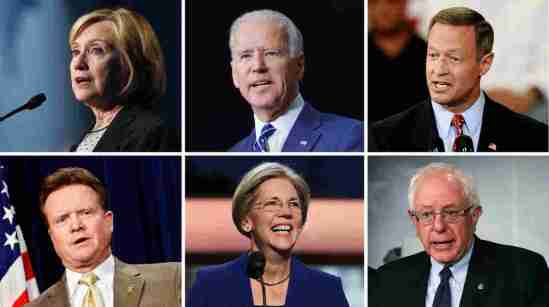The 2008 Democratic presidential primary fight proved that the Clinton machine can be beaten despite enjoying enormous advantages in terms of funding, connections, and name recognition. The question is: can Bernie Sanders repeat in 2016 what no one thought possible in 2008? Although Sanders can’t mechanically follow candidate Barack Obama’s playbook, team Sanders has to adapt some of that playbook’s strategic principles to have a shot at winning.
Tag Archives: Hillary Clinton
Is the Democratic Party a Capitalist Party? Not Exactly
Mark Lause, in his denunciation of Democratic Socialists of America’s support of the leftmost Democrats, claims that every single Democrat is a “Wall Street flunky.” I must assume that this means that he thinks that every single Democrat is taking cash from finance capital, if not some other corporate source.

Socialist Upton Sinclair — 1934 Democratic Gubenatorial Candidate and Wall Street Flunky?
Sanders’ Campaign: Shell Game to Save the Two-Party System or Third Party Breeding Ground?
Arun Gupta’s “The Only Article You Need to Read About the 2016 Election” avoids the typical, weak ‘left’ objections to Bernie Sanders’ decision to seek the Democratic Party’s presidential nomination and bases itself instead on undisputable facts — namely, that “progressive challenges [to] the mainstream Democratic candidates” such as Dennis Kucinich in 2004 or Progressives for Obama of 2008 have not dragged the Democratic Party to the left politically but instead dragged progressives and socialists to the right. Gupta’s argument is that this is will be the social function and/or objective outcome of Sanders’ campaign, its socialist gloss and the genuinely oppositional intentions of its participants notwithstanding. Continue reading
Why Pundits Are Wrong About Hillary Clinton’s ‘Inevitable’ Victory Over Bernie Sanders
The corporate commentariat anointed Hillary Clinton the winner of the fight for Democratic Party presidential nomination less than 24 hours after Bernie Sanders declared his candidacy. Nate Cohn of the New York Times writes, “The left wing of the Democratic Party just isn’t big enough to support a challenge to the left of a mainstream liberal Democrat like Mrs. Clinton” and Bill Sher of Politico notes, “With Clinton generally polling around 60 percent among Democrats, having four candidates divvy up the remaining tally is a recipe for a Hillary coronation.” Even the usually careful, data-driven site FiveThirtyEight.com exclaims that Sanders “doesn’t have a shot” since “polls show Sanders doesn’t match up well against Clinton. He trails her by nearly 57 percentage points nationally, 54 percentage points in Iowa and 40 percentage points in New Hampshire.”
Here’s why three big reasons why they’re wrong. Continue reading
The Case for Bernie: Part 2
By Dustin Guastella
The Democratic Field: Clinton v. Warren v. Bernie
The media have already christened Hillary Clinton as the Democratic nominee. Clinton’s coronation should come as no surprise, as she has positioned herself as a friend of Wall Street (and Wal-Mart). She advocates fiscal discipline and so-called “privatized Keynesianism” and takes her political advice from “the markets.” She prides herself on her role in gutting welfare, her aggressive foreign policy and her close relationships with Republican leaders. Most damning of all: BENGHAZI! I don’t think I have to convince readers of this blog that she is the epitome of a neoliberal Democrat and her candidacy represents what Tariq Ali calls “the extreme center”.
The Case for Bernie: Part 1
By Dustin Guastella
Senator Bernie Sanders has been mulling over a presidential run for the past few months and is set to make an announcement this week or next about his potential candidacy. Bernie, a self-proclaimed and vocal socialist, is a talented campaigner, a remarkably successful politician and broadly popular across the ideological spectrum in his home state. Should he decide to run, socialists need to play an active role in building his campaign, but we also need to think carefully about why a Bernie candidacy is important and how socialists should best support and shape such a campaign. For starters, I don’t think socialists should work for Bernie in the hopes of “reclaiming” the Democratic Party (when was it ours to begin with?). Further, Bernie’s presidential run shouldn’t be seen as a means to pull Clinton to the left, a failing strategy for sure. Continue reading
How Upton Sinclair Upended California’s Democratic Party and the Lessons for Bernie Sanders’ 2016 Run
Never in American history has a socialist been elected governor of a state, but in 1934 Upton Sinclair came close. He almost became governor on a program known as EPIC — End Poverty in California.
American socialists typically think of Eugene V. Debs’ 1912 presidential campaign as the high point of their movement since Debs won 6% of the vote, or just over 900,000 votes. Sinclair nearly matched that in 1934 by winning 879,000 votes, some 37% of the electorate. With two dozen EPIC candidates elected to the California legislature in 1934, Sinclair’s 37% was a far more politically meaningful result than Debs’ one-in-a-lifetime single-digit showing.
Despite nearly matching Debs’ power at his peak, the EPIC Sinclair campaign of 1934 has all but disappeared from the historical memory of American socialism. Almost a century later, it is the greatest story never told. These days, EPIC warrants but a single misleading mention by one Leninist journal and seems forgotten by the Democratic Socialist of America, a group that advocates the very strategy Sinclair and his followers pursued in 1934 — capturing the Democratic Party for socialism.

